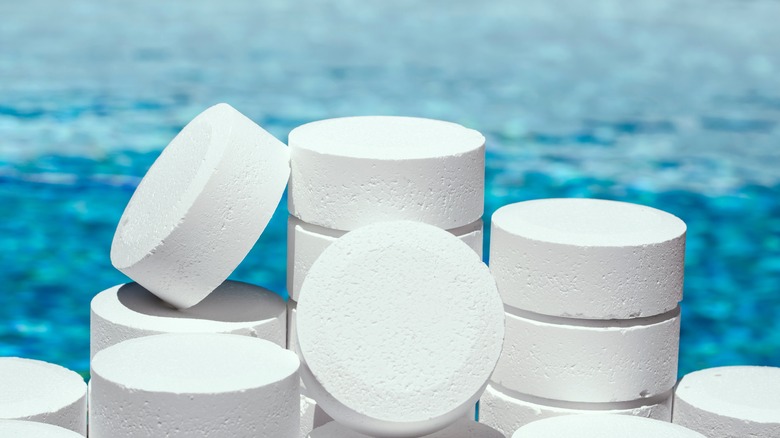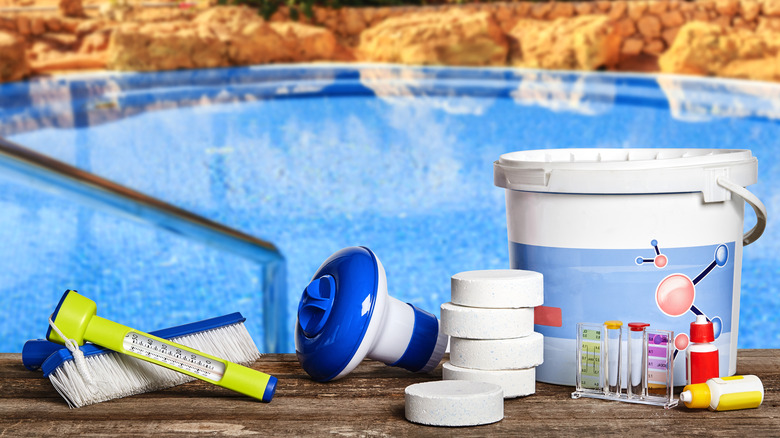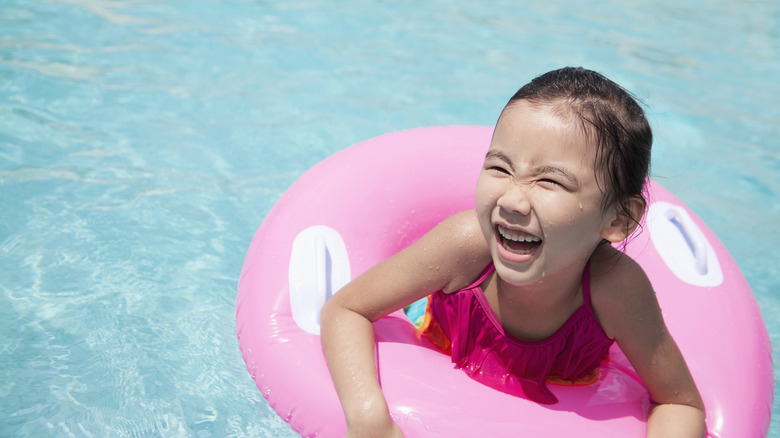Storing Chlorine Pool Tablets: Common Mistakes That Could Lead To A Disaster
People swim, float, and otherwise frolic in chlorinated pools on the regular, so it's easy to lose sight of the fact that chlorine is very much a chemical. Chemicals have some dangerous properties, like their tendency to interact with other substances, their potential for skin and eye irritation, and so on. Because of this, it is beyond important that chemicals like chlorine be stored with the utmost care, both in and out of season.
Most swimming pool owners don't drain the amenity very often, if at all. However, since rainwater, bacteria, and other byproducts introduced by swimmers and environmental factors affect the water's balance, it's necessary to frequently (and literally) test the waters, then add chemicals as needed. In particular, the main job of chlorine is killing germs, which everyone can agree is pretty important. Even in the off-season, some amount of chlorination tends to be necessary, which is why public and private pool owners keep it on hand. However, the where and how of chlorine storage is every bit as specific as how the chemical is administered to ensure that the product stays both safe and effective.
Maximize chlorine's shelf life by following these tips
Pool supplies are not cheap, so most people want to maximize their lifespan so that everything gets used and nothing is wasted. Unfortunately, many people make some common mistakes, like storing chlorine in areas prone to excessive heat or in the wrong type of packaging, that can compromise the product's effectiveness.
Fortunately, chlorine tablets can last a pretty long time (between 3 and 5 years!) if stored properly. Ideally, chlorine tablets should be placed in a bucket (many come packaged in one) or another container that can seal up nice and tight. This will help the chlorine to stay good for longer, especially if placed in a climate-controlled area. Ideally, this spot will run between 50 and 70 degrees Fahrenheit, and will also be in a room that has good ventilation and is nice and dry. Excessive heat actually makes the chlorine tablets break down, so really try to stick to the temperature suggestions if longevity is important.
Many pool enthusiasts choose liquid chlorine instead of the tablet variety. This is often because it's cheaper, and while that's certainly valid, liquid chlorine doesn't last as long (only about six months). And it will only hit that mark if it is stored exactly the same as already discussed for chlorine tablets.
Safety concerns when storing chloring
We already touched on using a tightly concealed container to store chlorine. While that's important to keep the product from going bad, leaving chlorine tablets out in the open or in an easy-to-access container can lead to children or pets getting into the dangerous chemical. This is a huge concern because chlorine poisoning can occur if ingested, which is obviously very dangerous. Fortunately, it's easy enough to prevent this from happening by following a few simple guidelines. First, seek out chlorine that is in child-proof or resistant packaging (it's always important to keep chemicals in their original packaging). For good measure, also utilize locks and/or child-safety latches to keep curious onlookers from getting into a dangerous situation. It is much easier to prevent chlorine exposure than it is to treat it, so take steps to keep kids and pets out of any and all chemicals for their safety and your peace of mind.
It's also hugely important to keep chlorine and other pool chemicals in their own tightly sealed container to avoid accidental mixing, and thus potentially dangerous reactions and toxic fumes. Additionally, never store chlorine near exhaust fumes, such as in a garage for the same reason. Chlorine should also be stored at a safe distance from anything that puts out any kind of heat, like pipes or space heaters. Accidental exposure to chlorine, especially when it reacts with another substance is highly problematic and should be avoided at all costs.


